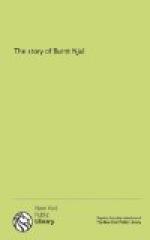or not at his will. As soon as it was born, the
child was laid upon the bare ground; and until the
father came and looked at it, heard and saw that it
was strong in lung and limb, lifted it in his arms,
and handed it over to the women to be reared, its
fate hung in the balance, and life or death depended
on the sentence of its sire. After it had passed
safely through that ordeal, it was duly washed, signed
with Thorns holy hammer, and solemnly received into
the family. If it were a weakly boy, and still
more often, if it were a girl, no matter whether she
were strong or weak, the infant was exposed to die
by ravening beasts, or the inclemency of the climate.
Many instances occur of children so exposed, who, saved
by some kindly neighbour, and fostered beneath a stranger’s
roof, thus contracted ties reckoned still more binding
than blood itself. So long as his children remained
under his roof, they were their father’s own.
When the sons left the paternal roof, they were emancipated,
and when the daughters were married they were also
free, but the marriage itself remained till the latest
times a matter of sale and barter in deed as well as
name. The wife came into the house, in the patriarchal
state, either stolen or bought from her nearest male
relations; and though in later times when the sale
took place it was softened by settling part of the
dower and portion on the wife, we shall do well to
bear in mind, that originally dower was only the price
paid by the suitor to the father for his good will;
while portion, on the other hand, was the sum paid
by the father to persuade a suitor to take a daughter
off his hands. Let us remember, therefore, that
in those times, as Odin was supreme in Asgard as the
Great Father of Gods and men, so in his own house every
father of the race that revered Odin was also sovereign
and supreme.
In the second place, as the creed of the race was
one that adored the Great Father as the God of Battles;
as it was his will that turned the fight; nay, as
that was the very way in which he chose to call his
own to himself,—it followed, that any appeal
to arms was looked upon as an appeal to God.
Victory was indeed the sign of a rightful cause, and
he that won the day remained behind to enjoy the rights
which he had won in fair fight, but he that lost it,
if he fell bravely and like a man, if he truly believed
his quarrel just, and brought it without guile to the
issue of the sword, went by the very manner of his
death to a better place. The Father of the Slain
wanted him, and he was welcomed by the Valkyries,
by Odin’s corse-choosers, to the festive board
in Valhalla. In every point of view, therefore,
war and battle was a holy thing, and the Northman
went to the battlefield in the firm conviction that
right would prevail. In modern times, while we
appeal in declarations of war to the God of Battles,
we do it with the feeling that war is often an unholy
thing, and that Providence is not always on the side
of strong battalions. The Northman saw Providence
on both sides. It was good to live, if one fought
bravely, but it was also good to die, if one fell
bravely. To live bravely and to die bravely, trusting
in the God of Battles, was the warrior’s comfortable
creed.




